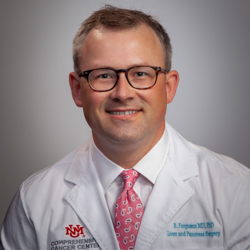
Embracing Complexity
Dr. Ben Ferguson says the complicated challenges posed by cancer care are what drew him to surgical oncology
Ben Ferguson, MD, PhD, was drawn to cancer care because it’s complicated.
“I got involved in cancer research as a medical student and really fell in love with some of the problems that the field of cancer care faced and was intrigued by the intersection of research questions and clinical questions,” Ferguson says. “That really put me on the track of wanting to be a physician that treats cancer patients.”
It wasn’t always this way. Ferguson grew up in Chicago and is the son of two physicians. His father is a thoracic surgeon and his mother is an anesthesiologist. In his youth, Ferguson says, he tried to avoid following in his parents’ footsteps. But by the time he was in college, scientific questions began to fascinate him.
“Despite my best efforts to avoid it, I really realized the science was something I was interested in,” Ferguson says. “And medicine provided the best way I could tell at the time to do something with that science knowledge in terms of making an impact on certain people’s lives.”
Ferguson joined the University of New Mexico, School of Medicine and the UNM Comprehensive Cancer Center as a surgical oncologist in August.
He completed a fellowship in complex general surgical oncology at the Memorial Sloan Kettering Cancer Center in New York from 2018 to 2020. Prior to that, Ferguson completed a residency in general surgery, including one year as an administrative chief resident, at the University of Chicago, Department of Surgery.
Ferguson also completed his MD, a PhD in cancer biology and a Medical Education Research, Innovation, Teaching and Scholarship fellowship at the University of Chicago.
He received his Bachelor of Science in molecular and integrative physiology from the University of Illinois at Urbana-Champaign.
“I was inevitably drawn to surgery based on the exposure I had from my parents, but I was intrigued by it for the basic reason that it tends to provide patients with somewhat immediate results,” Ferguson says.
Ferguson said he felt no pressure to get into surgery and to some extent was encouraged to look at other options because of the time commitment it requires.
The complexity of problems cancers pose drew his attention, and the collaborative approach to treating cancers also fascinates him.
“From biochemistry to immunology to certain aspects of microbiology – all of those are in some interplay,” he says.
“It was a bit of good luck in the sense that this University was looking for a surgeon that overlapped quite a bit with my clinical interests and my research interests,” he says. “Once I arrived, I really fell in love with the city and surrounding environment. Since arriving, I’ve found it to be a very easy place to live, with happy neighbors.”
Ferguson said the UNM Comprehensive Cancer Center is a draw because of its designation as a National Cancer Institute comprehensive center, the highest endorsement available from the NCI.
The designation, he says, gives UNM credibility among patients and providers and ensures that resources are available to physicians working at the center.
But Ferguson said he also likes the relatively small size of UNM and the Department of Surgery, because it means he will have plenty of opportunities to stay busy.
“The state of New Mexico has a somewhat unique patent population, in that there is a fairly high rate of somewhat rare cancers, especially liver and gallbladder cancers,” Ferguson says. “Some of these are diseases that interest me, so it’s a good opportunity to become involved in their care.”
The UNM Comprehensive Cancer Center also provides strong opportunities for research and clinical trials and the potential to collaborate with other physicians and research scientists, Ferguson says, adding that he has a strong background in research in which he has collaborated with medical oncologists, biostatisticians and epidemiologists.
Ferguson says he would like to treat cancers of the stomach and esophagus and also is interested in surgical education. He is serving as the associate Program director of the complex general surgical oncology fellowship at the UNM Comprehensive Cancer Center, which received its first fellow this year.
While a move from the big cities of New York and Chicago to Albuquerque might bring a degree of culture shock, Ferguson said there’s plenty of upside to the Duke City.
“The weather is much better here,” he says. “The opportunities for outdoor activities are much better here. The cost of living is much better here. I think the overall attitude of the population is much better here.”
At UNM Cancer Center, Ferguson will focus on treating cancers of the liver, pancreas and bile ducts.